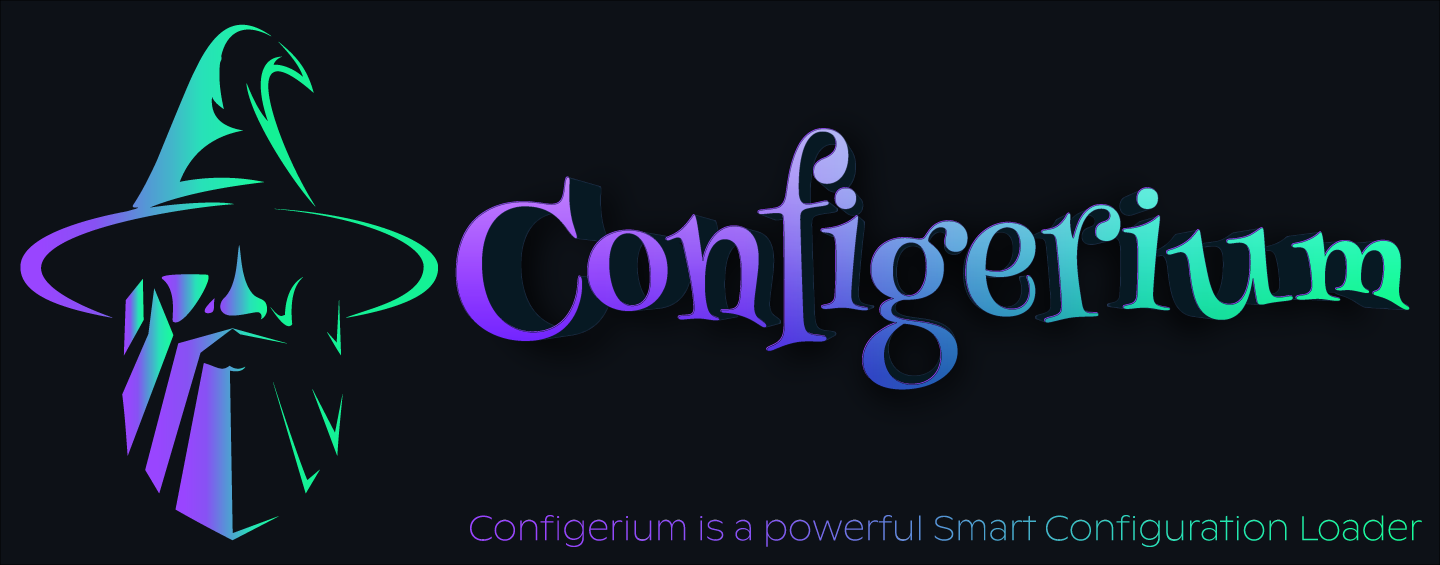🔮🛠️ Unleash the power of configuration with Configerium! This state-of-the-art package eliminates the hassle of loading and managing configurations in your projects. With its intelligent capabilities and user-friendly API, you can effortlessly handle various configuration files and environments. 💡🚀 Elevate your application's configuration process with ease and precision using Configerium!
📂 JSON, CJS, TypeScript, and ESM config loader with nyxblabs/dynot
🎛️ RC config support with nyxblabs/configorium
🔗 Multiple sources merged with nyxblabs/CodeBoost/nyxdefaults
🌍 .env support with dotenv
📦 Reads config from the nearest package.json file
🧩 Extends configurations from multiple local or git sources
🔄 Overwrite with environment-specific configuration
👀 Config watcher with auto-reload and HMR support
Install:
# nyxi
nyxi configerium
# pnpm
pnpm install configerium
# npm
npm install configerium
# yarn
yarn add configeriumImport:
// ESM
import { loadConfig, watchConfig } from "configerium";
// CommonJS
const { loadConfig, watchConfig } = require("configerium");Load configuration:
// Get loaded config
const { config } = await loadConfig({});
// Get resolved config and extended layers
const { config, configFile, layers } = await loadConfig({});Configerium merges config sources with nyxblabs/CodeBoost/nyxdefaults in the following order:
1️⃣ Config overrides passed by options
2️⃣ Config file in CWD
3️⃣ RC file in CWD
4️⃣ Global RC file in the user's home directory
5️⃣ Config from package.json
6️⃣ Default config passed by options
7️⃣ Extended config layers
Resolve configuration from this working directory. The default is process.cwd()
Configuration base name. The default is config.
Configuration file name without extension. Default is generated from name (name=foo => foo.config).
Set to false to avoid loading the config file.
RC Config file name. Default is generated from name (name=foo => .foorc).
Set to false to disable loading RC config.
Load RC config from the workspace directory and the user's home directory. Only enabled when rcFile is provided. Set to false to disable this functionality.
Loads .env file if enabled. It is disabled by default.
Loads config from nearest package.json file. It is disabled by default.
If true value is passed, Configerium uses name field from package.json.
You can also pass either a string or an array of strings as a value to use those fields.
Specify default configuration. It has the lowest priority and is applied after extending config.
Specify default configuration. It is applied before extending config.
Specify override configuration. It has the highest priority and is applied before extending config.
Custom nyxblabs/dynot instance used to import configuration files.
Custom nyxblabs/dynot options to import configuration files.
Environment name used for environment specific configuration.
The default is process.env.NODE_ENV. You can set envName to false or an empty string to disable the feature.
If resolved config contains an extends key, it will be used to extend the configuration.
Extending can be nested, and each layer can extend from one base or more.
The final config is the merged result of extended options and user options with nyxblabs/CodeBoost/nyxdefaults.
Each item in extends is a string that can be either an absolute or relative path to the current config file pointing to a config file for extending or the directory containing the config file.
If it starts with either github:, gitlab:, bitbucket:, or https:, Configerium automatically clones it.
For custom merging strategies, you can directly access each layer with the layers property.
Example:
// config.ts
export default {
colors: {
primary: "user_primary",
},
extends: ["./theme"],
};// config.dev.ts
export default {
dev: true,
};// theme/config.ts
export default {
extends: "../base",
colors: {
primary: "theme_primary",
secondary: "theme_secondary",
},
};// base/config.ts
export default {
colors: {
primary: 'base_primary',
text: 'base_text'
}
}The loaded configuration would look like this:
{
dev: true,
colors: {
primary: 'user_primary',
secondary: 'theme_secondary',
text: 'base_text'
}
}Layers:
[
{ config: /* theme config */, configFile: /* path/to/theme/config.ts */, cwd: /* path/to/theme */ },
{ config: /* base config */, configFile: /* path/to/base/config.ts */, cwd: /* path/to/base */ },
{ config: /* dev config */, configFile: /* path/to/config.dev.ts */, cwd: /* path/ */ },
]Users can define environment-specific configuration using these config keys:
$test: {...}$development: {...}$production: {...}$env: { [env]: {...} }
configerium tries to match envName and override environment config if specified.
Note: Environment will be applied when extending each configuration layer. This way layers can provide environment-specific configuration.
Example:
{
// Default configuration
logLevel: 'info',
// Environment overrides
$test: { logLevel: 'silent' },
$development: { logLevel: 'warning' },
$production: { logLevel: 'error' },
$env: {
staging: { logLevel: 'debug' }
}
}you can use watchConfig instead of loadConfig to load config and watch for changes, add and removals in all expected configuration paths and auto reload with new config.
onWatch: This function is always called when config is updated, added, or removed before attempting to reload the config.acceptHMR: By implementing this function, you can compare old and new functions and returntrueif a full reload is not needed.onUpdate: This function is always called after the new config is updated. IfacceptHMRreturns true, it will be skipped.
import { watchConfig } from "configerium";
const config = watchConfig({
cwd: ".",
// chokidarOptions: {}, // Default is { ignoreInitial: true }
// debounce: 200 // Default is 100. You can set it to false to disable debounced watcher
onWatch: (event) => {
console.log("[watcher]", event.type, event.path);
},
acceptHMR({ oldConfig, newConfig, getDiff }) {
const diff = getDiff();
if (diff.length === 0) {
console.log("No config changed detected!");
return true; // No changes!
}
},
onUpdate({ oldConfig, newConfig, getDiff }) {
const diff = getDiff();
console.log("Config updated:\n" + diff.map((i) => i.toJSON()).join("\n"));
},
});
console.log("watching config files:", config.watchingFiles);
console.log("initial config", config.config);
// Stop watcher when not needed anymore
// await config.unwatch();- Clone this repository
- Enable Corepack using
corepack enable(usenpm i -g corepackfor Node.js < 16.10) - Install dependencies using
nyxi - Run interactive tests using
nyxr dev
MIT - Made with 💞




